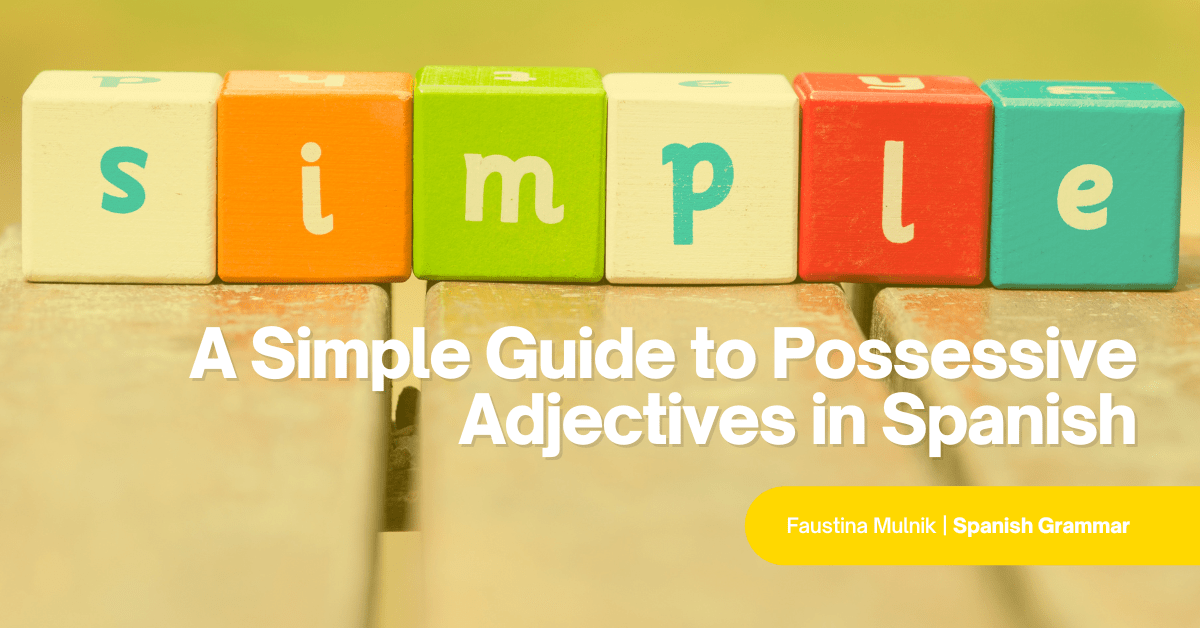
‘Haber De’ vs ‘Haber Que’ in Spanish: What’s the Difference?
When you start studying Spanish, you learn the verb haber quite early, and it doesn’t seem very complicated. However, later things start to change. Apparently, it’s enough to add small words such as “de” or “que” to “haber to get a different meaning. But the meaning doesn’t always change! Why? What’s the rule? If you’re one of the desperate learners trying to untangle the...Read More
A Simple Guide to Possessive Adjectives in Spanish
Quickly learn how to express ownership using possessive adjectives in Spanish with this helpful guide! In this blog post, I go over the two different forms of possessive adjectives in detail and explain the difference between possessive adjectives and pronouns. There’s even a free printable worksheet and interactive quiz at the end for extra practice. Get ready to discuss your...Read More
What Does ‘Mande’ Mean in Spanish?
Have you ever heard someone using the word mande in Spanish? It’s usually a way to reply to a question not understood or to ask what’s needed. Well, this simple and apparently harmless word has an incredible backstory that strongly resonates in the Mexican past. Keep reading to discover why Mexicans reply with a strange mande or mande usted when called. Learn the actual meaning of...Read More
A Massive List of Spanish Adjectives and How To Use Them
Are you improving in your Spanish fluency, but still struggling to describe people accurately? This is a normal stage in most students’ Spanish-learning process. You may have mastered the grammar rules, but are still short in vocabulary. I’m here to help you solve that! Keep reading to learn what adjectives are and how to use them—discover a massive list of...Read More
What are Spanish ‘Go Verbs’?
Do you know what Spanish “go verbs” are? What about “yo-go” verbs? These two terms actually mean the same thing—they refer to a category of irregular Spanish verbs. When conjugated in the present indicative, these verbs end in -go in the first person (yo) form. For example: Yo hago mi tarea. (hacer)I do my homework. Yo pongo mi cuaderno en el escritorio. (poner)I put my notebook...Read More
28 Spanish Suffixes To Boost Your Fluency to Super-Human Status
Spanish suffixes are a great way of increasing your vocabulary without learning new words. If you learn these little Spanish word endings, called suffixes, you’ll be able to create hundreds of new words. (Exciting, right?) And with this giant list and lesson by your side, you’ll be ready to start expressing yourself in Spanish better than you ever have. In this guide, you’ll...Read More
Comparatives and Superlatives in Spanish
Are comparatives and superlatives in Spanish really that useful? Let’s see: Can you speak more slowly? I like that one more. You’re the best! It’s the most difficult word to pronounce! They’re more useful than you may have realized! Superlatives and comparatives in Spanish are everywhere, and learning them is definitely worth your time. Table of Contents:...Read More
How to Use Vosotros When You Talk to Spanish Speakers in Spain
Vosotros in Spanish is rarely used in Latin America, but if you’re planning to visit Spain and want to blend in, it’s essential for you to master vosotros and know how it works. Using vosotros instead of ustedes is one of the slight differences that distinguish Latin American Spanish from European Spanish. It is possible to learn when to use it by recognizing key variations from one...Read More
Ir + a + Infinitive: The Near Future Tense in Spanish
Ir + a + infinitive is a simple Spanish formula for expressing the near future. In fact, a similar formula exists in English, where we swap ir for “going”: What are you going to do today? Who are you going to see? Where are you going to go this weekend for fun? Discussing your plans and intentions for the future are an important part of daily conversations and in Spanish,...Read More
